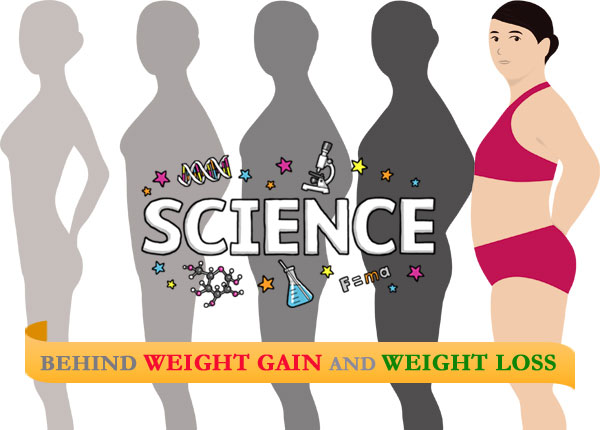25 May Science Behind Weight Loss and Wight Gain
This post is also available in: Hindi

Every problem has its solution hidden within, only when you know the reason that has raised the problem. The same thing implies to the science of weight gain. If you desire to lose weight, you should first know the reason of your weight gain and why you are continuously gaining it. Once you get to know the exact reasons of your weight gain, we’ll try to eradicate them.
We’ve all definitely heard about the term ‘calories’. Energy is measured in calories. Our body needs a certain amount of calories for physical and mental tasks. We gain calories through eating and drinking. If we consume excess calories than our body requires, then those extra calories will be stored in our body in the form of fat. If this process goes on, more and more fat is accumulated in our body which leads to weight gain.
To reduce body weight, we have to work in the opposite direction of the above mentioned process.We have to ensure that we consume a fewer amount of calories than what our body requires. Now you would surely question that how would our body function if we consume fewer calories since it will not generate the required amount of energy which our body needs on a daily basis.
The amazing thing about human body is that when energy goes on reducing extensively, it utilizes the stored fat to generate energy, and this process is known as fat burning.
Now let’s talk about how this process actually works in our body in a scientific manner and what fat exactly is and why it goes on increasing.
What is fat and how its increases (Weight Gain)
When we eat food, it digests and forms a type of sugar, which is called glucose. It resides in our blood. When glucose in present in the blood, our pancreas produces insulin, which acts as a gatekeeper and deposits the glucose in our muscle cells (which is called glycogen). This glucose helps to give energy to our muscles and our whole body. But it has a limit. For this reason, the remaining glucose is stored with the fatty acids in our fat cells. The fat cells are present in all human bodies, irrespective of them being thin or fat.
How Fat burn or reduces (Weight Loss)
Not consuming food for a certain period of time results in deduction of glucose, because of which the insulin level degrades. Now your body needs to regain energy for which more glucose is required. It can be achieved through two ways, either by eating again, or the body uses fat acids which goes in our blood and generates energy.
In this manner, the fat which is deposited at the place reduces. This is a regular process. This is the reason we have enough energy after we wake up despite not having food for the whole night. Now, if we keep on eating more food, then the glucose level always remains high in our blood. This will tend the insulin to deposit the glucose in our muscle cells continuously. When the muscle cells will reach a limit, the remaining glucose will start depositing in the fat cells. Moreover, the glucose and insulin levels will never tend to decrease and the fat cells will keep on increasing altogether.
This explains the fact that eating more than the body requires results in access accumulation of fat.
There are mainly two solutions to reduce fat/Weight:
- Exercise– Exercising tends to reduce the saved energy (glycogen) in our muscles, which leads our muscle cells to collect more and more glucose from our blood. This results in less accumulation of glucose (fat acids) in our fat cells, which helps to maintain the body weight.
- Eating less– This will result in less formation of glucose in our blood, which will be compensated by the fat cells leading to burning of fat, and ultimately in weight loss. Here eating less means eating only nutrition Food in limited manner.
Now the question arises, which elements are present in the food we eat?
There are mainly three types of elements, which are carbohydrates, protein and fat. Except for fat, carbohydrates are also responsible for increasing the glucose level in our body. That is the reason many people suggest to follow a low-carb diet for losing weight. You can learn more about these three nutrition’s including fat here.
I have tried to explain the complex process in a simple manner with no usage of biological terms so that a common man can easily understand the science behind weight gain and weight loss.
Some scientists believe that there are many theories behind the formation of fat. Burning of fat does not result in formation of energy, but rather CO2 (carbon dioxide) and H20 (water). CO2 leaves the body through exhalation and H2O through sweating, urination and tears.
There are two ways in which more CO2 and H2O can exit the body:
- More physical work
- Eat less
So, any weight loss theory ultimately suggests only two ways of losing weight, exercise and eating less(Proper Diet).
If you liked my article, please share it with your friends or if you have any questions, please do not hesitate to comment below.
NOTE - Friends, I am not dietitian or Doctor, I write information here on the basis of my own 25 kilo weight loss experience and sometimes from online research. Please take doctor advice before applying any tip, as each and every human body is different.


No Comments